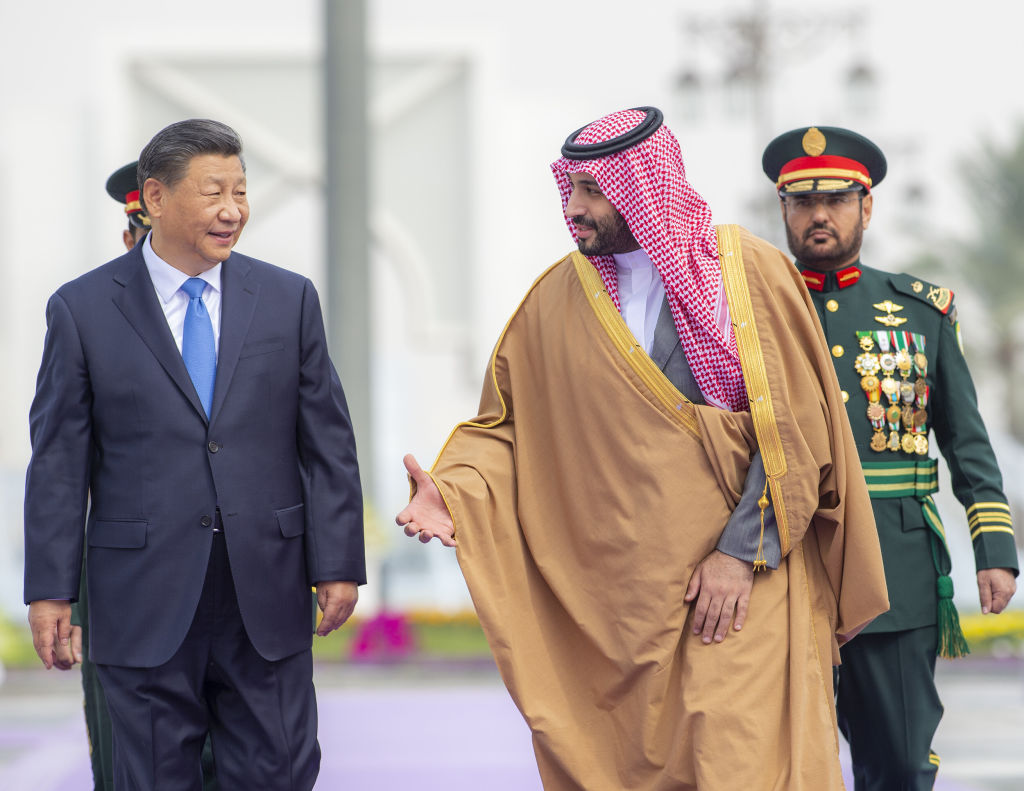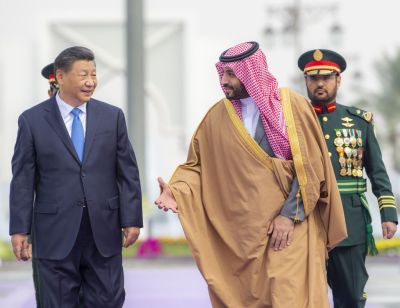Saudi Arabia’s theatrical reception during Chinese President Xi Jinping’s December visit garnered plenty of attention. What didn’t was the most consequential aspect: Xi’s offer to mediate restored diplomacy between Saudi Arabia and longtime regional foe Iran.
Xi’s proposal came to light Friday when Chinese Foreign Minister Wang Yi met with top Iranian and Saudi Arabian officials in Beijing to unveil a normalization agreement between the adversaries. They now have two months to finalize the deal and reopen embassies in each other’s capitals, but the rapprochement's full implementation—contingent on Iran’s good behavior—is far from assured.
Saudi Arabia and Iran broke ties after Iranian protesters overran the Saudi embassy in response to Riyadh's execution of a Shiite cleric in 2016, but sectarian differences, clashing allegiances, and Iranian proxy warfare have long marred their relationship.
In a joint statement with China, Saudi Arabia and Iran pledged “non-interference in the affairs of other countries and respect for their sovereignty” as part of the effort to mend ties. To Tehran this reportedly included the demand that Saudi Arabia, which it accuses of fueling local unrest using saboteurs and regime-hostile media outlets, extricate itself from Iranian domestic affairs. Riyadh, meanwhile, requested that the Islamic Republic and its regional militias cease their attacks on the kingdom. Both sides claim to want a durable resolution to the eight-year civil war in Yemen.
For Iran, rapprochement would deliver a badly-needed foreign policy win amid domestic upheaval. Faced with protests over 22-year-old Mahsa Amini’s death in custody and a currency whose value is plummeting, the Islamic Republic’s support at home has hit new lows in recent months. A deal with Saudi Arabia, and the fence-mending with other Arab states that may follow, could go a long way in boosting Iran’s economy and repairing the regime’s cracking legitimacy.
Iran national security chief Ali Shamkhani praised the warming relationship as a bulwark against “undue intervention” from the West and “constant mischief” by the “Zionist regime” Israel. Iranian-armed militants in the region, including the head of Lebanese militant group Hezbollah, also welcomed the move.
But whether Tehran is willing or able to uphold its end of the bargain remains to be seen. Implementing the deal will require Iran to keep the Islamic Revolutionary Guard Corps (IRGC) Quds Force and its proxy network in check, which, if history is any indication, may prove challenging.
“How does the IRGC halt its regional adventurism through the Quds Force and remain true to its mission? It is unlikely Tehran will agree to withdraw the Quds Force from the region. But absent a withdrawal of the Quds Force, the agreement will always be at risk,” said Norman Roule, former National Intelligence Manager for Iran, adding that Iranian-backed militias operating independently of Iranian commanders also pose a threat to normalization.
Despite paying lip service to peace in Yemen, Iran has continued its arms shipments to the Houthis, even as negotiations with Saudi Arabia were ongoing. The U.S. Navy has in recent months seized a number of weapons—including some 5,000 assault rifles, antitank missiles, and 1.6 million rounds of small arms ammo—being smuggled into the war-torn country.
Acutely aware of Iran’s track record, Riyadh plans to watch the regime’s behavior closely over the next two months.
“They are unfortunately known to backtrack on agreements, and use them strategically to achieve short-term goals,” Faisal J. Abbas, editor-in-chief of the Saudi Arabia-based Arab News, said in an interview. “The attitude is we will forgive, but we will not forget. So everybody’s clear-eyed about Iran’s history when it comes to agreements, and things will be monitored very closely.”
China, meanwhile, stands to gain plenty if the agreement is finalized. Economic considerations likely drove China’s diplomatic effort at least in part: Saudi Arabia is now China’s top oil supplier, creating a vested interest for Beijing to safeguard Saudi oil facilities and shipments from Iran and its proxies.
But the agreement is also a boon for China’s bid for regional influence, potentially at the United States’ expense. Chinese officials and media outlets have in recent days praised the deal as another signal of the end of a “unipolar,” U.S.-led world order. Though this is the first such agreement China has brokered in the Middle East, it’s part of a string of recent regional diplomatic and economic initiatives by Beijing. Chinese officials reportedly plan to lead a summit including Iran and the Gulf Cooperation Council in the coming months.
“It’s hard for me to spin it as anything but negative for the U.S. and U.S. standing in the Middle East,” said John Hannah, a senior fellow at the Jewish Institute for National Security of America and a former national security advisor to Vice President Dick Cheney. “Whether it’s a big deal in and of itself or not, it suggests potentially a trend line, a trajectory going forward in terms of China’s ambitions diplomatically and militarily—not just economically—in this part of the world that we need to be mindful of.”







Please note that we at The Dispatch hold ourselves, our work, and our commenters to a higher standard than other places on the internet. We welcome comments that foster genuine debate or discussion—including comments critical of us or our work—but responses that include ad hominem attacks on fellow Dispatch members or are intended to stoke fear and anger may be moderated.
With your membership, you only have the ability to comment on The Morning Dispatch articles. Consider upgrading to join the conversation everywhere.